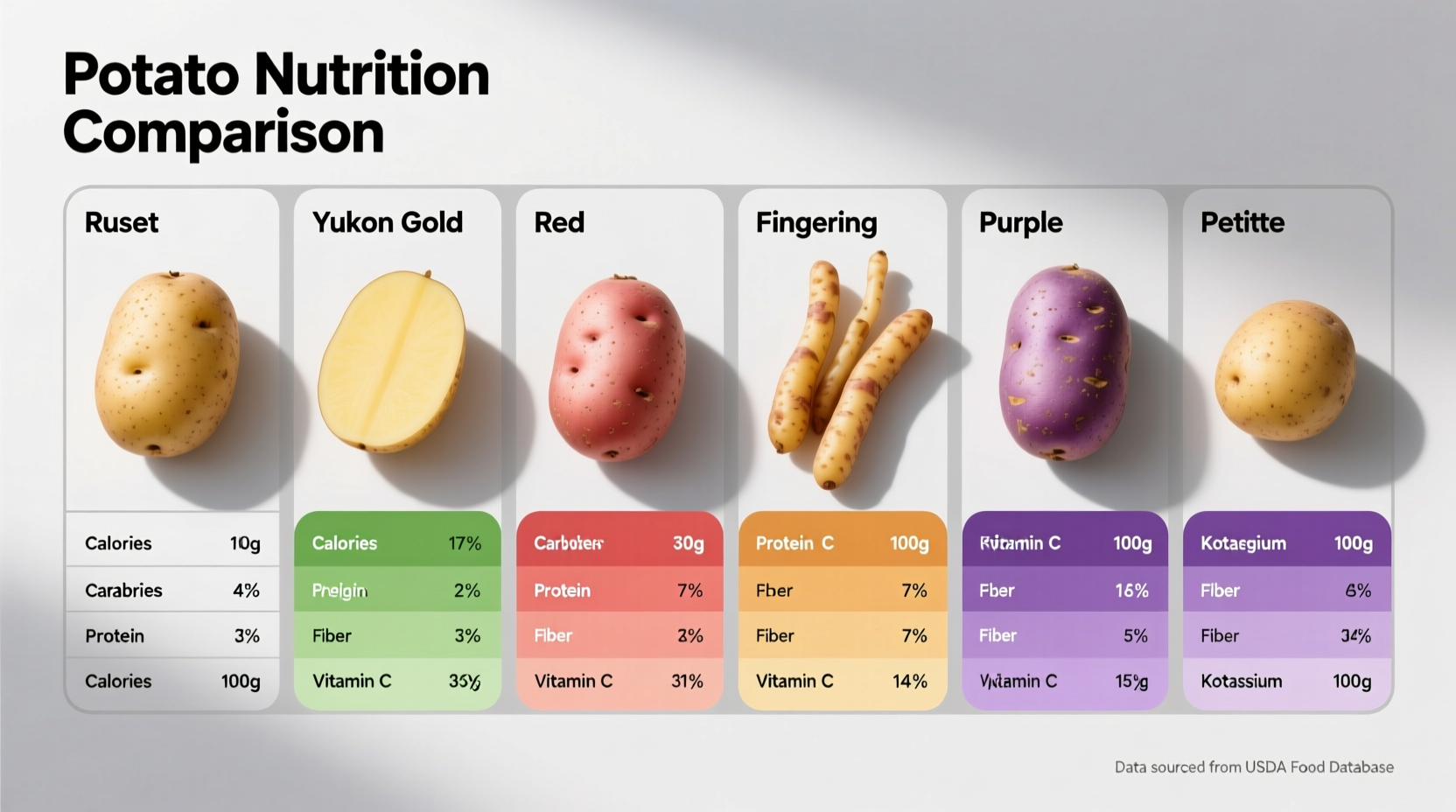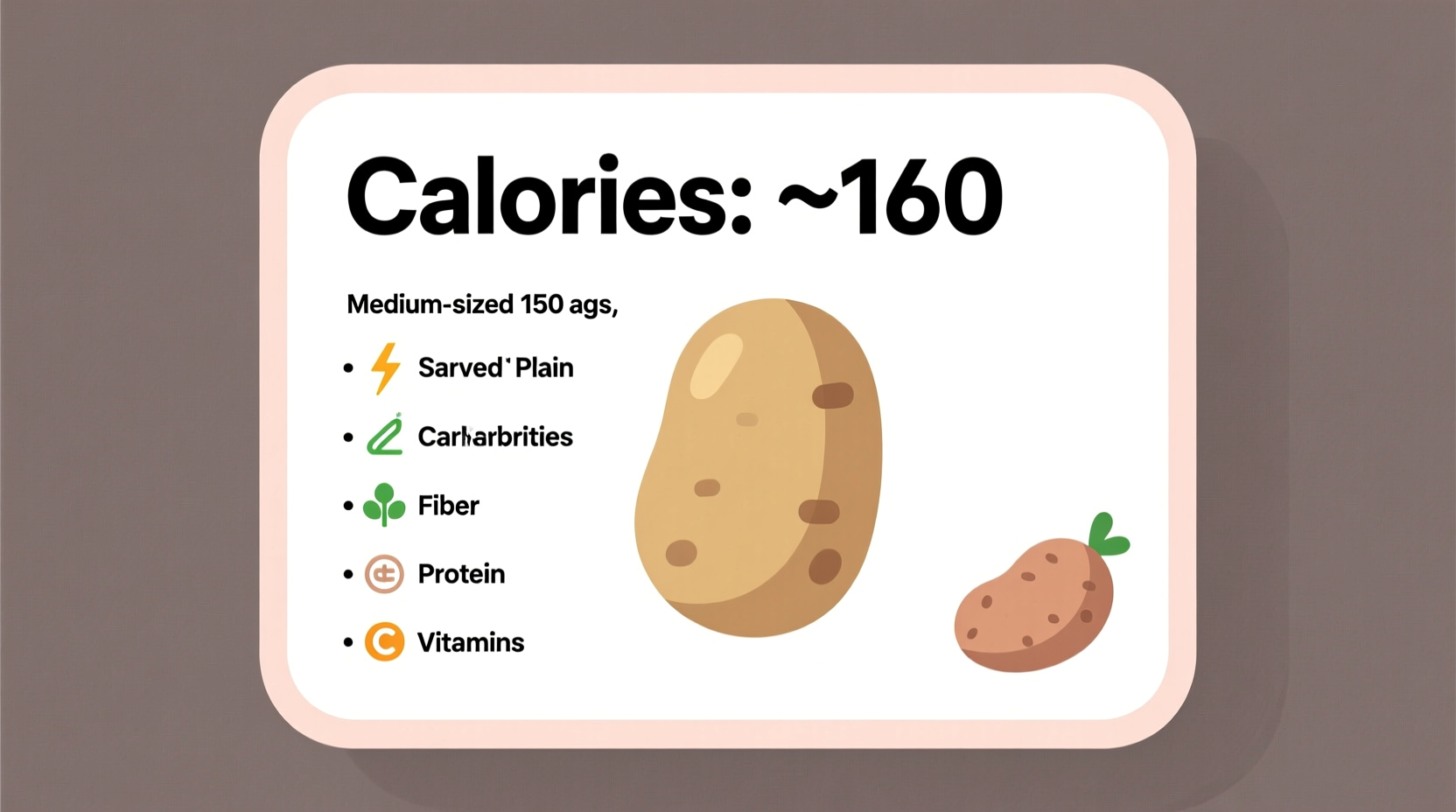Understanding potato calories helps you make informed dietary choices without eliminating this versatile, nutrient-rich food from your meals. Whether you're managing weight, tracking macros, or simply curious about nutrition, knowing the precise calorie content of potatoes—and how preparation methods dramatically affect it—gives you practical control over your eating habits.
Exact Calorie Counts by Potato Type
Not all potatoes are created equal when it comes to calorie content. The variety, size, and cooking method significantly impact the final count. Here's what USDA FoodData Central reports for common preparations:
| Potato Type | Portion Size | Calories | Carbohydrates | Fiber |
|---|---|---|---|---|
| Russet (baked) | Medium (148g) | 168 | 37g | 3.8g |
| Sweet potato (baked) | Medium (130g) | 103 | 24g | 3.8g |
| Red potato (boiled) | Medium (150g) | 130 | 29g | 2.6g |
| French fries (fast food) | Medium order (117g) | 365 | 48g | 4.2g |
| Mashed potatoes (homemade) | 1 cup (210g) | 237 | 37g | 3.7g |
This comparison shows how preparation methods can triple the calorie content of potatoes. While a plain baked russet provides 168 calories, the same potato transformed into french fries contains more than double that amount. The USDA National Nutrient Database remains the most reliable source for these standardized measurements (fdc.nal.usda.gov).
How Potato Size Affects Calorie Counting
"Medium" means different things in nutrition science than in everyday language. The USDA defines potato sizes as:
- Small: 138g (about 2" diameter) = 150 calories
- Medium: 173g (about 3" diameter) = 168 calories
- Large: 299g (about 4" diameter) = 290 calories
Restaurant portions often exceed these standards significantly. A typical "baked potato" at many chain restaurants weighs 300-400g—delivering 300-450 calories before adding toppings. Being aware of actual portion sizes prevents unintentional calorie overconsumption.

Nutritional Benefits Beyond Calories
Potatoes offer substantial nutritional value beyond their calorie count. A medium russet potato provides:
- 45% of your daily vitamin C needs
- 26% of vitamin B6 requirements
- 21% of potassium intake
- Significant amounts of magnesium and iron
Sweet potatoes dramatically outperform regular potatoes in vitamin A content, delivering 377% of your daily requirement in one medium serving. The Harvard T.H. Chan School of Public Health notes that potatoes' high potassium content helps regulate blood pressure, while their resistant starch content (especially when cooled after cooking) supports gut health (hsph.harvard.edu).
Preparation Methods That Make the Biggest Difference
Your cooking technique transforms potato nutrition. Consider these evidence-based preparation impacts:
- Boiling: Retains most nutrients but may leach some water-soluble vitamins. Adds no extra calories.
- Baking: Concentrates natural sugars slightly but preserves most nutrients. No added calories from cooking.
- Frying: Absorbs significant oil—adding 100-200+ calories depending on method and oil type.
- Cooling after cooking: Increases resistant starch content by up to 50%, reducing net digestible carbs.
The Academy of Nutrition and Dietetics confirms that adding just 1 tablespoon of butter (102 calories) or sour cream (61 calories) significantly increases the calorie count of a plain potato. Opting for Greek yogurt or salsa instead creates flavorful, lower-calorie alternatives (eatright.org).
Smart Ways to Include Potatoes in Balanced Meals
You don't need to eliminate potatoes to maintain a healthy diet. Try these practical strategies:
- Eat the skin for added fiber (contains nearly half the potato's fiber)
- Pair with protein sources like grilled chicken or fish to balance blood sugar response
- Cool cooked potatoes before eating to increase resistant starch content
- Use smaller portions (4-6 oz) as part of a vegetable-focused meal
- Replace higher-calorie starches like white rice or pasta with potatoes
Registered dietitians recommend viewing potatoes as a vegetable rather than a starch in meal planning. This perspective shift helps incorporate them appropriately within balanced eating patterns without excessive calorie intake.











 浙公网安备
33010002000092号
浙公网安备
33010002000092号 浙B2-20120091-4
浙B2-20120091-4